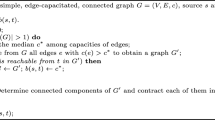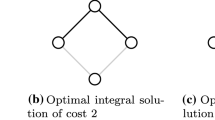Summary
This paper presents Ω(m logn) and Ω(mn) messages lower bounds on the problem of computing a gobal sensitive function in biderectional networks with link failures (i.e., dynamically changing topology), wheren andm are the total number of nodes and links in the network. The Ω(m logn) lower bound is under the assumption thatn is a-priori known to the nodes, while the second bound is for the case in which such knowledge is not available. A global sensitive function ofn variables is a function that may not be computed without the knowledge of the values of all then variables (e.g. maximum, sum, etc). Thus, computing such a function at one node of a distributed network requires this node to communicate with every other node in the network. Though lower bounds higher than Ω(m) messages are known for this problem in the context of link failures, none holds for dense bidirectional networks. Moreover, we are not aware of any other nontrivial lower bound higher than Ω(m) for dense bidirectional networks.
Similar content being viewed by others
References
Frederickson GN, Lynch NA: Electing a leader in a synchronous ring. ACM 34(1): 98–115 (1987)
Pach J, Korach E, Rotem D: A technique for proving lower bounds for distributed maximum-finding algorithms. In: Proc of the 14th Annu ACM Symp on Theory of Computing, pp 378–382, 1982
Frederickson GN, Lynch NA: A general lower bound for electing a leader in a ring. Tech Rep CSD-TR-512. Purdue University, 1985
Goldreich O, Shrira L: The effect of link failures on computations in asynchronous rings. In: Proc of the ACM Symp on Principles of Distributed Computing, 1986
Linial N: Distributive graph algorithms — global solutions from local data. In: Proc of the 28th IEEE Annu Symp on Foundation of Computer Science, pp 331–335, 1987
Cidon I, Shavitt Y: Message terminate algorithms for rings of unknown size. In: Proc of the 6th Int Workshop on Distributed Algorithms. Lect Notes Comput Sci, vol 647. Springer, Berlin Heidelberg New York 1992, pp 264–276
Goldreich O, Shrira L: Consultation in the presence of faults: two lower bounds. Tech Rep, Technion, 1985
Afek Y, Landau GM, Schieber B, Yung M: The power of multimedia: combining point-to-point and multiaccess networks. Inf Comput 84(1): 97–118 (1990).
Segall A: Distributed network protocols. IEEE Trans Inf Theory, IT-29(1): 23–35 (1983)
Goldreich O, Shrira L: On the complexity of computation in the presence of link failures: the case of a ring. Distrib Comput 5: 121–131 (1991)
Goldreich O, Sneh D: On the complexity of global computation in the presence of link failures: the case of uni-directional faults. In: Proc 11 th ACM Symp on Principles of Distributed Computing, pp 103–111, 1992
Afek Y, Gafni E: End-to-end communication in unreliable networks. In: Proc of the 7th ACM Symp on Principles of Distributed Computing, pp 131–148, 1988
Afek Y, Gafni E: Bootstrap network resynchronization: an efficient technique end-to-end communication. In: Proc of the 10th Annu ACM Symp on Principles of Distributed Computing (PODC), 1991
Author information
Authors and Affiliations
Additional information
Yehuda Afek received a B.Sc. in Electrical Engineering from the Technion and an M.Sc. and Ph.D. in Computer Science from the University of California, Los-Angeles. In 1985 he joined the Distributed Systems Research Department in AT&T Bell Laboratories as a Member of Technical Staff. In 1988 he joined the Computer Science Department in Tel-Aviv University, where he now holds a permanent position. From 1989 to 1994 he was also a consultant for AT&T Bell Laboratories. His interests include communication protocols, distributed computing and asynchronous shared memory systems.
Danny Hendler was born in Kiryat-Haim near Haifa, Israel, on April 17th 1961. He received his B.Sc. and M.Sc. in Computer Science from Tel-Aviv University, Israel, in 1986 and 1993, respectively. In the past 8 years he has worked as a free lance software-consultant, specializing mainly in communication, telephony and voice-mail applications.
Rights and permissions
About this article
Cite this article
Afek, Y., Hendler, D. On the complexity of global computation in the presence of link failures: the general case. Distrib Comput 8, 115–120 (1995). https://doi.org/10.1007/BF02242713
Received:
Accepted:
Issue Date:
DOI: https://doi.org/10.1007/BF02242713




